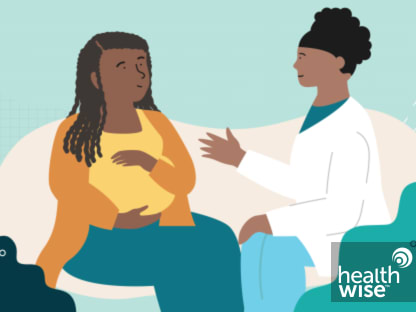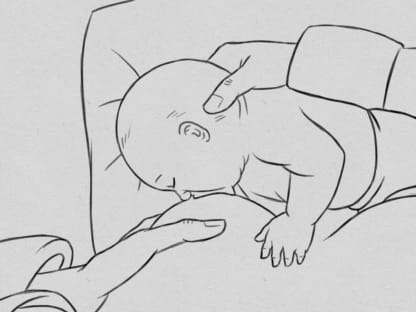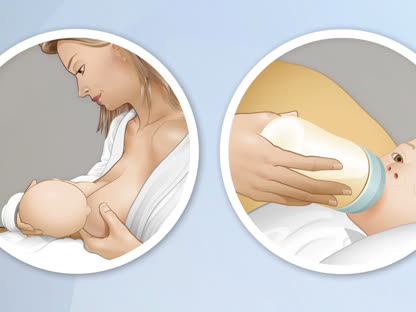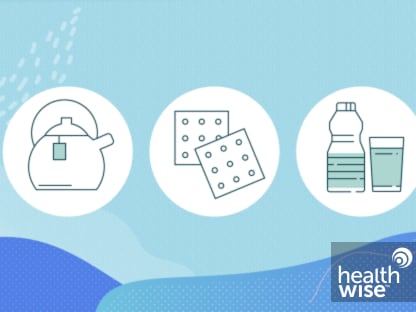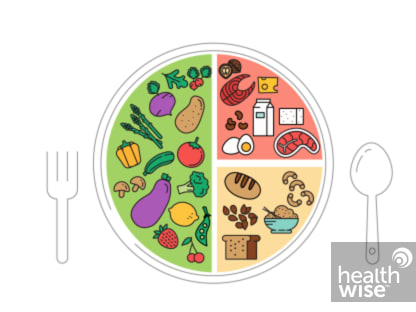Condition Basics
What is a multiple pregnancy?
A multiple pregnancy means that there are two or more babies in the uterus. A pregnancy of twins or more is considered to be high-risk. Problems are more common in multiple pregnancies than in pregnancies of one fetus (singleton pregnancy).
The babies in a multiple pregnancy may be identical or fraternal.
Identical siblings
Babies that come from the same egg are called identical. This happens when one egg is fertilized by one sperm, and the fertilized egg then splits into two or more embryos.
Experts think that the process that results in identical siblings happens by chance. It isn't related to the parents' age, race, or family history.
If the babies you're carrying are identical, the siblings:
- Are all of the same sex, either all boys or all girls.
- All have the same blood type.
- Probably will have the same body type and the same color skin, hair, and eyes. But they may not look exactly the same. They also won't have the same fingerprints.
Fraternal siblings
Babies that come from different eggs are called fraternal. This happens when two or more eggs are fertilized by different sperm.
Fraternal twins tend to run in families. This means that if anyone in your family has had fraternal twins, you're more likely to have them too.
If the babies you're carrying are fraternal, the siblings:
- May be of different sexes.
- May have different blood types.
- May look different from each other or may look the same, as some brothers and sisters do.
What makes a multiple pregnancy more likely?
You are more likely to have a multiple pregnancy if you take fertility drugs or have in vitro fertilization. Other things that increase your chance of a multiple pregnancy include being age 35 or older or having fraternal twins on your side of the family.
What are the risks of a multiple pregnancy?
Any pregnancy has risks. But the chance of having problems is higher in a multiple pregnancy, and the risk increases with each extra baby you carry at the same time.
Being pregnant with more than one baby raises the risk of problems such as:
- High blood pressure and preeclampsia.
- Gestational diabetes.
- Preterm labor, which may lead to premature (preterm) birth. Preterm birth increases the babies' risk of lung, brain, heart, and eye problems.
- Miscarriage.
- Having a baby with a genetic condition or birth defect.
These problems may not happen to you. Many people have healthy multiple pregnancies and deliver healthy babies.
What are the symptoms?
You can expect to have the same symptoms during a multiple pregnancy that you'd have during a pregnancy with one fetus. But the symptoms may happen earlier and may be worse. For example, a multiple pregnancy may cause early or severe morning sickness.
How can you tell if you're carrying more than one baby?
A fetal ultrasound can show how many babies are in your uterus. Your doctor can also use the ultrasound to check the health and growth of the babies.
What prenatal exams and tests will you need?
Your doctor will do a physical exam at each visit. The doctor may also do a fetal ultrasound, check your blood pressure, and test your blood and urine for any signs of problems. If problems are found, early treatment can help you and your babies stay healthy.
Health Tools
Health Tools help you make wise health decisions or take action to improve your health.
Cause
You're more likely to have a multiple pregnancy if you take fertility drugs or have in vitro fertilization.
- Fertility drugs help your body make several eggs at a time. This increases the chance that more than one egg will be fertilized.
- For in vitro fertilization, the doctor may put several fertilized eggs in the uterus. This increases the chance of having at least one baby. But it also makes a multiple pregnancy more likely.
You're also more likely to have more than one baby at a time if:
- You're age 35 or older.
- You've had fraternal twins before. Babies that come from different eggs are called fraternal.
- Anyone on your side of the family has had fraternal twins.
Learn more
Symptoms
You can expect to have the same symptoms during a multiple pregnancy as you'd have during a pregnancy with one fetus (singleton pregnancy). But the symptoms may happen earlier and may be worse.
A multiple pregnancy may cause:
- Early or severe nausea and vomiting (morning sickness).
- Extra weight gain.
- Backache.
- A uterus that is larger than expected given your due date.
Later in the pregnancy, you may be more likely to have problems such as:
- Hemorrhoids.
- Increasing backache.
- Trouble breathing, caused by the uterus pushing up on the diaphragm.
- Indigestion, caused by pressure on the stomach from the uterus.
If you are having symptoms and they bother you, talk to your doctor. There may be things you can do to help your symptoms.
What Happens
Multiple pregnancies rarely last for the usual 40 weeks. For twins, the average time to delivery is 35 weeks. For triplets, the average time is 32 weeks. For quadruplets, the average time is 30 weeks.footnote 1 The earlier babies are born, the greater their risk of health problems.
Risks of a multiple pregnancy
Any pregnancy has risks. But the chance of having problems is higher in a multiple pregnancy. The risks increase with each extra baby you carry at the same time.
Keep in mind that these problems may not happen to you. Many who are pregnant with more than one baby have healthy pregnancies and deliver healthy babies.
Problems during pregnancy
Problems that are more likely when you are carrying twins or more include:
- Preeclampsia, a problem that causes your blood pressure to get too high.
- Gestational diabetes, a type of diabetes that can occur while you're pregnant.
- Problems with the placenta, such as placental abruption or placenta previa.
- Low iron levels (anemia).
- Too much amniotic fluid in the uterus (polyhydramnios).
- Miscarriage.
Problems during labor and delivery
Labor and delivery problems that are more likely in a multiple pregnancy include:
- Preterm labor, which may lead to premature (preterm) birth. Being born early increases the babies' risk of lung, brain, heart, and eye problems.
- The need for delivery by cesarean section (C-section).
- Heavy blood loss after delivery (postpartum hemorrhage).
Problems with the babies
Possible problems for the babies in a multiple pregnancy include:
- Birth defects and genetic conditions. Certain genetic conditions and birth defects may be more likely to occur in multiple pregnancies.
- Vanishing twin syndrome. This is when one of two fetuses disappears sometime during the first 12 weeks of a pregnancy.
- Twin-to-twin transfusion. This can develop when two or more fetuses share the same placenta.
- Locking twins. These are multiple-birth babies who are positioned so that their chins are hooked together.
- Twins that share one amniotic sac (monoamniotic twins).
Learn more
Watch
Prenatal Care
You'll need to see your doctor more often during a multiple pregnancy than you would if you were having just one baby. It's important that you go to every appointment. At each prenatal visit, your doctor will do a physical exam. The doctor will also do tests to look for any signs of problems. If problems are found early, treatment can help you and your babies stay healthy.
Tests done during a multiple pregnancy
- Blood pressure checks are done at every prenatal visit to monitor you for high blood pressure or preeclampsia.
- Blood testing is used to check for low iron (anemia). Anemia is common in multiple pregnancies because the fetuses use a large part of your iron supply.
- A urine test and urine culture may be done to check for a urinary tract infection (UTI).
- Transvaginal ultrasound may be used to check the length of your cervix. A short cervix may be a sign of an increased risk of preterm labor.
- Fetal ultrasound will be done several times during the pregnancy to monitor the babies' growth and amniotic fluid.
- An oral glucose screen may be done early in pregnancy and in the second trimester to check for gestational diabetes.
Testing for genetic conditions and birth defects
You may also have tests to check for genetic conditions and birth defects.
There are two types of tests that may be done.
- Screening tests.
-
- Screening tests show the chance that a baby has certain conditions. They can't tell you for sure that your baby has a problem.
- Some screening tests are not as accurate when you are carrying more than one baby.
- Diagnostic tests.
-
- Diagnostic tests can show if a baby has certain conditions. These tests include chorionic villus sampling (CVS) and amniocentesis. They take a small sample from the placenta or from the fluid around the baby.
- CVS and amniocentesis both have a slight risk of miscarriage.
Ask your doctor about your testing options.
Early pregnancy decisions about triplets or more
Being pregnant with triplets or more increases the fetuses' risk of disability or death. And the risk rises with each extra baby you carry. If you are carrying triplets or more, your doctor may offer multifetal pregnancy reduction (MFPR). This procedure reduces the number of fetuses, usually to two. This may help the remaining fetuses survive. And it may help you have a healthy pregnancy.
MFPR is usually done early in a pregnancy. It may be done after genetic testing to find out if the fetuses have any problems.
The decision to have this procedure can be a hard one to make. MFPR sometimes leads to infection or miscarriage of the remaining fetuses. Your doctor can help you weigh the risks of carrying multiple fetuses against the risks of having the procedure. You may want to discuss this decision with your family and a counselor or spiritual advisor.
Learn more
Watch
Self-Care
There are some simple ways to help yourself have a healthy multiple pregnancy. The best thing you can do is take care of yourself. The healthier you are, the healthier your babies will be.
- Go to every doctor's appointment.
Starting in the 20th week of pregnancy, you may have a checkup every other week. Starting at the 30th week, you may have checkups more often.
- Eat healthy foods.
Choose foods rich in folic acid, iron, and calcium. These nutrients are essential for the healthy growth of your babies. Breads, cereals, meats, milk, cheeses, fruits, and vegetables are all good choices.
If you're not able to eat enough because of severe morning sickness, call your doctor.
- Don't smoke, drink alcohol, or use marijuana or other drugs.
These substances can harm your babies. Talk to your doctor if you need help with quitting.
- Avoid or limit caffeine.
Limit caffeine to about 200 to 300 mg per day. On average, a cup of brewed coffee has around 80 to 100 mg of caffeine. Caffeine is also found in many soft drinks, energy drinks, and chocolate. The total caffeine in an energy drink may be more than the recommended amount.
- Avoid using any medicines, vitamins, or herbs unless your doctor says it's okay.
If you need medicine, your doctor can tell you which ones are safe during pregnancy.
- Talk to your doctor about what type and level of activity is safe for you.
Your doctor may recommend that you stop physically demanding work or exercise.
Ask your doctor if you need to change your work activities, based on how well your pregnancy is going. Your doctor can write your employer a note about work activity changes you may need. The doctor can also talk to you about your options for medical leave if needed.
- Get plenty of rest.
- Plan ahead for an early delivery.
You're likely to deliver early, so be prepared. Your doctor can help you arrange to deliver at a hospital that can do an emergency C-section and has a neonatal intensive care unit (NICU).
After your babies are born
After your babies are born, you may have many feelings. You may feel tired or overwhelmed. Or you may wonder how you are going to do it all. Many new parents feel this way.
Here are some things that may help you adjust to your new life:
- Accept help from friends and family.
Get extra help for as long as possible after your babies are born. Let family and friends bring meals, go grocery shopping, or do household chores. Or ask them to help with the babies while you take some time for yourself.
- Get organized.
Baby tasks like diapering, feeding, and bathing can sometimes feel like they're taking over your life. Try to make a plan for each day. Following a schedule may help you stay organized and efficient.
- Rest whenever you can.
Try to sleep when your babies are sleeping, rather than using that time to get chores done. Don't feel guilty if you leave chores undone.
- If you plan to breastfeed, be flexible.
You may be able to breastfeed all your babies, or you may use a breast pump or formula so helpers can feed your babies. A lactation consultant can help you find ways to make breastfeeding work.
- Join a support group for parents with multiples.
This is a great place to share your concerns and hear how other parents cope with the demands of raising multiples. Support can also come from a counselor, other community groups, or religious or spiritual groups.
- Make time for the rest of your family.
- If you have a partner, try to find time to be a couple.
- If you have older children, schedule some one-on-one time with them.
- Be alert for postpartum depression.
It's normal to have some sadness, anxiety, and mood swings after delivery. It may help to talk with a trusted friend or family member. You can also call the Maternal Mental Health Hotline at 1-833-TLC-MAMA (1-833-852-6262) for support. If these mood changes last more than a couple of weeks, talk to your doctor or midwife.
Learn more
- Alcohol or Drug Use During Pregnancy
- Breastfeeding Multiple Infants
- Caffeine During Pregnancy
- Depression: Managing Postpartum Depression
- Medicines During Pregnancy
- Nutrition During Pregnancy
- Partner Support During Pregnancy
- Pregnancy: Chemicals, Cosmetics, and Radiation
- Pregnancy: Dealing With Morning Sickness
- Pregnancy: Hot Tub and Sauna Use
- Quitting Smoking
Watch
Related Information
References
Citations
Credits
Current as of: July 15, 2025
Author: Ignite Healthwise, LLC Staff
Clinical Review Board
All Ignite Healthwise, LLC education is reviewed by a team that includes physicians, nurses, advanced practitioners, registered dieticians, and other healthcare professionals.
Current as of: July 15, 2025
Author: Ignite Healthwise, LLC Staff
Clinical Review Board
All Ignite Healthwise, LLC education is reviewed by a team that includes physicians, nurses, advanced practitioners, registered dieticians, and other healthcare professionals.
